Curriculum
Stockton offers Bachelor of Arts and Bachelor of Science degrees.
Some majors offer both the B.A. or the B.S. degree.
| Bachelor of Arts | Bachelor of Science | |
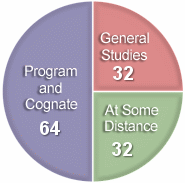 |
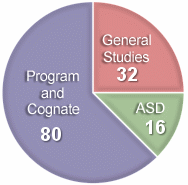 |
A transfer student with 64 credits coming into Stockton would complete the following credits:
| Bachelor of Arts | Bachelor of Science | |
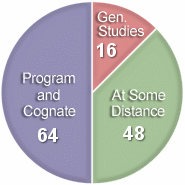 |
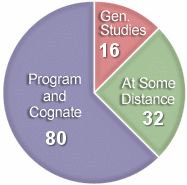 |
Minors are just like majors except they involve fewer credits, usually 20-24. Like a major, they must be completed at the time of graduation (i.e., students may not return to Stockton after graduation in order to earn a minor). Minors need not require any additional credits beyond the 128 needed to graduate. Potentially, these 20-24 credits can be wholly contained in other categories.
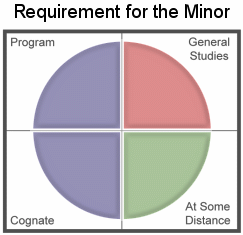
For example, GSS 2301 (Perspectives on Women) can be used both for the General Studies requirement and as a course for the Women's Studies minor.
Visit the Degree Programs page to find the available minors offered at Stockton.
Program and Cognate courses are the largest group of credits for any degree. Program courses give depth of study in a major subject. Cognates are courses which are closely related to Program courses in any chosen major.
Program and Cognate courses make up half of the total credits for the B.A. degree:
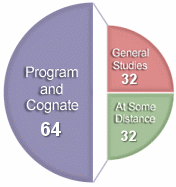 |
|
|||||||||||||||
For the B.S. degree, almost two-thirds of the degree is devoted to in-depth study in the major and closely related subjects:
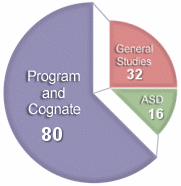 |
|
|||||||||||||||
25% of all the courses a student takes at Stockton must be in General Studies Courses. This is called "The 25% Rule." This rule applies to transfer students as well as first-year students.
For first-year students and transfer students with less than 64 credits:
| Bachelor of Arts | Bachelor of Science | |
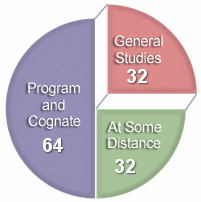 |
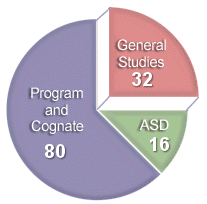 |
The 32 credits for General Studies must be taken in the following array:
| 8 Credits GAH | 4 Credits GEN | 4 Credits GIS | 8 Credits GNM | 8 Credits GSS |
| Courses in the visual and performing arts, literature, philosophy and religion. | Courses which develop skills that can be used in a variety of areas, such as writing, public speaking, and foreign languages. | Junior/Senior courses that bring views and methods of several disciplines together to examine a theme or problem. | Courses in life sciences, physical sciences, and mathematics. | Courses in social issues an problems. |
If you have transfer credits, some of these may be allocated as General Studies courses:
- 1-15 transfer credits: no General Studies equivalencies awarded
- 16-31 transfer credits : up to 1 General Studies equivalency awarded
- 32-47 transfer credits: up to 2 General Studies equivalencies awarded
- 48-59 transfer credits: up to 3 General Studies equivalencies awarded.
- 60 or more transfer credits: no equivalencies granted.
For all freshmen and transfer students: Your Degree Works online degree evaluation will calculate which general studies will have to be completed at Stockton.
For students with 64 transfer credits: Bachelor of Arts / Bachelor of Science.
| Bachelor of Arts | Bachelor of Science | |
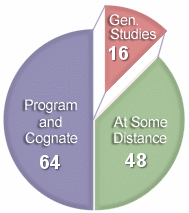 |
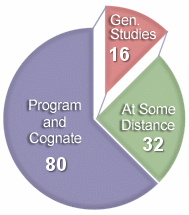 |
The General Studies requirement is shrunk to 16 credits. One GIS course must be completed as a part of those 16 credits; the other credits can be completed in any General Studies category. The At-Some-Distance credits then grows to 48 credits for the B.A. degree, and 32 credits for the B.S. degree. This is very helpful to the transfer student who may have many excess elective credits.
FOR ALL STUDENTS:
All students must complete, either at Stockton or in transfer:
At Stockton we believe that writing is an extremely important skill, regardless of one's major or career goals. A wide variety of courses help students develop their writing skills. In particular there are two main types of writing courses:
- Writing intensive courses (W1) focus on improving students' writing as their primary goal and basis for evaluation, and may investigate a theme or topic to provide subject matter for that writing.
- Writing across the curriculum courses (W2) focus on a topic either within a degree program or in General Studies, and use writing as an important means of learning and of evaluation.
In order to graduate, all students must complete:
- At least four (4) W1 or W2 courses with grades of C or better, including
- a W1 course taken during the freshman year, and
- at least one W1 or W2 course numbered 3000 or higher.
Both W1 and W2 courses are counted as part of a student's Program, Cognate, General Studies, or At-Some Distance courses; therefore, they do not necessarily require any credits beyond the 128 minimum to graduate.
Quantitative and mathematical skills are also important in virtually any career as well as in everyday life. Stockton seeks to assure that all students enhance these skills through two types of courses:
- Quantitative reasoning intensive courses (Q1) focus primarily on mathematical thinking; developing students' quantitative skills is the primary goal.
- Quantitative reasoning across the curriculum courses (Q2) focus on a topic or subject area outside of mathematics. Mastering that area is the primary goal of the course, but quantitative/mathematical thinking is used as an important means of learning the subject matter.
In order to graduate, all students must complete and pass:
- At least three (3) Q1 or Q2 courses, including
- at least one Q1 course (one must be taken during the freshman year), and
- at least one Q2 course
Both Q1 and Q2 courses are counted as part of a student's Program, Cognate, General Studies, or At-Some Distance courses; therefore, they do not necessarily require any credits beyond the 128 minimum to graduate.
All students matriculating in Fall of 1999 and thereafter must take and pass one course in each of four areas: Arts (A), Historical Consciousness (H), Values/Ethics (V), and International/Multicultural (I). The sole exception is for students already having the baccalaureate degree: such students are exempt from this and all General Studies requirements.
For students matriculating Fall 2021 and thereafter, two courses must be completed that deal with Race and Racism Education ("R" attributes) Only one R course may be transferred to the Stockton degree. All students must complete an R1 course, which covers Race and Racism Education 100% of the time. The second "R" course may be either an R1 or R2. An R2 course has content covering race and racism education at least 25% of the course time.
These courses, while required, do not add any credits to the minimum of 128 to graduate. Students may take Stockton courses that have been designated by A, H, V, and I and apply them to program, cognate, General Studies, and "At Some Distance" as appropriate.
For transfer students, one or more of these courses may already have been taken in transfer. Any unfulfilled categories must be completed at Stockton.
At-Some-Distance electives are not free, unrestrictive electives. They are defined as a category only when the student chooses a major program of study. The At-Some-Distance electives provide breadth of study in courses that are in some way unrelated to the students' major program. For example, a Sociology course would be considered At-Some-Distance for a Chemistry major, but as a Cognate for a Psychology major.
For first-year students and transfers with less than 64 credits, the At-Some-Distance electives constitute one-quarter of the degree for a Bachelor of Arts, and one-eighth of the Bachelor of Science degree:
| Bachelor of Arts | Bachelor of Science | |
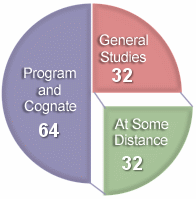 |
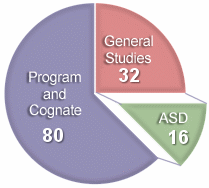 |
For students with 64 transfer credits, the At-Some-Distance electives increase by 16 credits, and the General Studies category shrinks by 16 credits. This makes the Stockton curriculum very receptive for transfer credits:
| Bachelor of Arts | Bachelor of Science | |
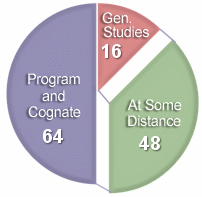 |
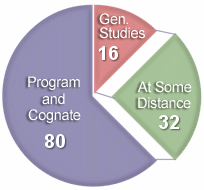 |


